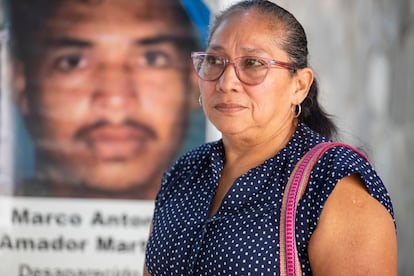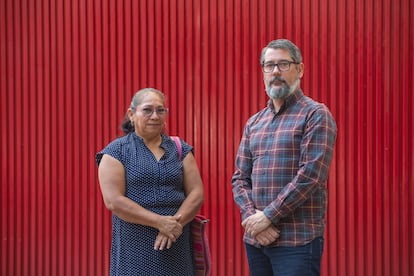Mary Martínez, a mother searching for her missing son: ‘I am not prepared to find him dead’
New documentary ‘Toshkua’ follows this Honduran woman as she works to find her son, Marco Antonio Amador. He disappeared 11 years ago between Nuevo Laredo and Reynosa, two cities in the northeastern Mexican state of Tamaulipas


Every time Mary Martínez has the opportunity to come to Mexico, her heart still gives her hope. Whether she’s in a taxi or some other means of vehicular transportation, she keeps an eye on the men’s faces, in case Marco Antonio Amador — the young man she’s looking for — is driving some vehicle. But her eyes also examine the people who are living on the streets: “the ones who are beaten, who’ve lost their minds and wander around. I walk and see them, looking for my son’s face,” she says quietly.
Mary has carried Marco Antonio on a printed poster everywhere for the past 11 years. This image — which reaches from her shoulders to her knees when she unfolds it — is the last one she has of him. It’s what he looked like when he left Honduras on February 22, 2013, in search of a better life. The last time she heard from him was on March 11 of that same year, when he was traveling through the northeastern Mexican state of Tamaulipas. Since then, this Honduran mother hasn’t given up trying to find the whereabouts of her son.
Despite all the time that has passed, the events remain fresh in Mary’s memory. She remembers that the last communication they had was at 3:30 in the afternoon. Marco Antonio was in the city of Nuevo Laredo, on the border between the United States and Mexico. A cousin of hers had found him a job in Reynosa, about 150 miles away, in the same state. An intermediary went to pick him up and give him a ride… but he was nowhere to be found.
“[My son] turned 33 recently, on March 2. He’s now been missing for 11 years,” she notes, sitting in a cafeteria in Mexico City.
Mary Martínez is 58-years-old and originally from Tegucigalpa, Honduras. She’s part of the caravan of mothers searching for missing migrants that come to Mexico every year from different Central American countries. They try to find clues about their loved ones, while also informing society about what’s happening, in an attempt to influence the situation.
Alongside the women who are in the same situation as she is, Mary has visited the country four times: she has toured the states of Chiapas, San Luis Potosí, Coahuila and Veracruz, among other states. On one of these trips, she met Ludovic Bonleux, a French film director who has lived in Mexico for decades. He was following the group of women, documenting the work they do.
“They’re all worthy of a documentary. Mary caught my attention because of her charisma, her way of leading searches and her very powerful voice. The particular case of Marco Antonio explains the situation in Honduras, which forces young people to flee from organized crime. They go through [many difficulties] when they try to reach the United States,” Bonleux says, in the cafeteria alongside Martínez, whom he decided to accompany. She is portrayed in Toshkua, his documentary about the mothers searching for their missing children.
Toshkua is a word from the Pesh language, spoken by the Indigenous communities of Honduras. It means “to disappear.” The film by Bonleux — who previously worked on another production about forced disappearances in the state of Guerrero — also tells a parallel story about someone named Francisco Hernández. It discusses how the lack of employment and the abandonment of the state in places such as La Mosquitia — the easternmost part of Honduras — result in the forced displacement of people in that country, as well as in other Central American nations.
In the case of Marco Antonio Amador — according to his mother — the violence and extortion that he experienced as a bus and taxi driver forced him to emigrate. “The violence and lack of work is too strong. He always said, ‘today, I didn’t make any money because I had to pay.’ He had his wife, his daughter… he barely had enough to bring them food. If the police weren’t extorting him, it was the criminal groups. He decided to [go North] to avoid being killed there (in Honduras), but unfortunately, here [in Mexico], they disappeared him,” Martínez laments.

With the support of the film — which took approximately three years to make and was recognized as the best documentary of 2023 by the Association of Film Journalists of Mexico — Martínez has been able to visit Mexico on various occasions. All in all, if you include the trips made by the other mothers, they’ve travelled to Mexico seven times in total. According to Mary, each year that passes, the road from Central America gets worse and worse, due to the violation of rights, kidnappings and human-trafficking.
“These criminal groups ask for money [from the families] if they want to free their loved ones. Sometimes they release them… but as they say: ‘we pay to have our relatives killed.’ For us, as mothers, going through Mexico is difficult, but [it’s far worse] for [the migrants]: they cross forested areas, they can be attacked by an animal, bitten by a snake, scorpions, spiders,” Martínez continues.
“Officially, there are more than 110,000 missing people in the country, but that figure only includes Mexicans and not migrants. Who knows how many migrants have disappeared in the last 20 years? I wish the governments had a more humanitarian approach. But so long as trying to resolve the issues that cause migration — like poverty, organized crime or climate change — isn’t on the table, not much can be done. The mafias continue to take advantage, just like the politicians with their electoral agenda: they’re not in favor of migrants,” Bonleux adds.
On each visit, Mary has visited different reception centers for migrants, gathering few clues. Her intuition tells her that her son could be in prison, since there’s a long history of massacres, human-trafficking, or cases of false imprisonment perpetrated by the Mexican police.
Bonleux regrets that more couldn’t have been done to search the detention centers. But he tells EL PAÍS how, for example, when they tried to access the prisons in Tamaulipas, it wasn’t possible due to the security conditions — a situation that has persisted in the state for more than 10 years, as a result of violence between the cartels — and the restrictions put in place by the prison authorities.
“They’re sentenced for [crimes] they haven’t committed and are locked up for many years. We found a boy who was only 16-years-old when he arrived in Mexico from Honduras. His mother found him in 2014 on her first trip to the country: he had been incarcerated for 13 years. His face and head were scarred — he had been badly beaten by the authorities, so that they could get him to plead guilty. We see that our children can also be victims of injustice,” Martínez sighs.
As the mothers search for their children, many doors as slammed in their faces, while various officials and institutions have tried to dissuade them from continuing. However, Mary has all the will to keep going. She says that both she, her late husband and her eldest son handed over their DNA to authorities and forensic investigators several years ago, but so far, they haven’t found a body with Marco Antonio’s genes. “That drives me to have faith to continue searching for him… [even] if God has it another way, I’m not prepared to find him dead, because what I want is to hug him, kiss him, talk to him about what happened during all these years. I’ve been told to ‘be prepared in case he’s dead.’ I will never be prepared to find a body with his DNA. Maybe they’ll give me some bones and I won’t see his face. His face is what I would like to see,” she says, her voice breaking.
Mary’s eyes get teary whenever she talks about Marco Antonio. She says that, together with the group of searching mothers, they’ve received a lot of emotional support and workshops to strengthen themselves and be able to continue, “to know how to live with the absence of our children.”
“The pain never leaves. It’s still there after 11 years. It’s like it was just yesterday when he left Honduras. To a mother who’s going through this, tell them that they’re not alone. And to our children — if you ever see them — tell them that we’re looking for them. We’ve never stopped looking for them,” she concludes.
Translated by Avik Jain Chatlani.
Sign up for our weekly newsletter to get more English-language news coverage from EL PAÍS USA Edition
Tu suscripción se está usando en otro dispositivo
¿Quieres añadir otro usuario a tu suscripción?
Si continúas leyendo en este dispositivo, no se podrá leer en el otro.
FlechaTu suscripción se está usando en otro dispositivo y solo puedes acceder a EL PAÍS desde un dispositivo a la vez.
Si quieres compartir tu cuenta, cambia tu suscripción a la modalidad Premium, así podrás añadir otro usuario. Cada uno accederá con su propia cuenta de email, lo que os permitirá personalizar vuestra experiencia en EL PAÍS.
¿Tienes una suscripción de empresa? Accede aquí para contratar más cuentas.
En el caso de no saber quién está usando tu cuenta, te recomendamos cambiar tu contraseña aquí.
Si decides continuar compartiendo tu cuenta, este mensaje se mostrará en tu dispositivo y en el de la otra persona que está usando tu cuenta de forma indefinida, afectando a tu experiencia de lectura. Puedes consultar aquí los términos y condiciones de la suscripción digital.








































